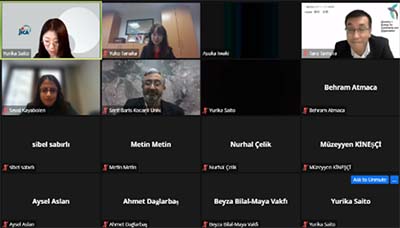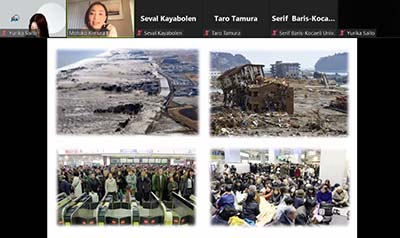JICA Seminar on Disaster Risk Reduction - Support for Foreigners Before and In Times of Disasters
2022.11.18
JICA's online seminar of "‘No One Left Behind' - Support for Foreigners Before and In Times of Disasters" was held on November 18th, 2022 for Turkish NGO/NPOs working in the area of disaster risk reductions. This was the second online seminar on disaster risk reduction for Turkish NGOs and NPOs following the one in January. The seminar focused on the support for foreigners, including refugees, in the field of disaster preparedness and disaster responses, in order to realize "No One Left Behind" concept of the SDGs.
In the event of a disaster, it is difficult to reach out to foreigners, including refugees, and various issues arise in terms of language, information, and cultural differences. As earthquake-prone countries, Japan and Türkiye share the same challenges in terms of reaching out to one of the most vulnerable people at the time of, and before the disasters.

In this seminar, representatives from the four Japanese organizations and NGO/NPOs exchanged their experiences with Turkish colleagues.
Mr. Taro TAMURA, Representative Director of the Institute for Human Diversity Japan, introduced the historical background and overall structures of the disaster responses to foreigners in Japan. He explained that disasters had the biggest impacts on the most vulnerable people including foreigners, and "multicultural coexistence" at the community level became important. Especially after the earthquakes in 2004 and 2007 in Japan, multilingual tools and mechanisms for the disaster responses, such as the Multilingual Support Center and the information coordinators for foreigners, had been developed. Mr. Tamura commented about the importance of preparing the guidelines beforehand, and recommended that the involvement of the foreigners themselves as the responders to the disasters would be effective.
Following Mr. Tamura's presentation, Ms. Asuka IWAKI, Deputy Director of Minoh Association for global Awareness (MAFGA), showed the examples of responses during the North Osaka Earthquake in 2018. She explained that the lack of information accelerated the fear for the disasters, and interestingly most of the people who evacuated to the evacuation centers were foreigners. From the experiences from the earthquake, she commented that the multilingual information sharing was very important. Ms. Iwaki also explained about the examples of the establishment of foreigners' community to respond to disasters.
Ms. Motoko KIMURA, Founder and Co-Executive Director of WaNavi Japan, shared with the audiences about their efforts on the promotion of disaster education for foreigners. Ms. Kimura emphasized that it was important for all the individuals, including foreigners, to be able to assess the risks by themselves. To do so, she introduced about certain steps to prepare for the earthquake, which WaNavi Japan usually shared with the foreigners. Ms. Kimura noted the importance of prior knowledge on how to obtain information at the time of disasters.
Finally, Ms. Yumiko TSURUKI, Team Leader of Integration Unit of Japan Association for Refugees (JAR), presented their approaches to support the most vulnerable people, including refugees. Ms. Tsuruki firstly explained about the challenges that the most vulnerable face at the time of disasters, such as the unstable legal status, job instability, economic difficulty, risks on the health and safety due to the fragile residences etc. She introduced that the most vulnerable people tended to reach out to NGOs with which they usually communicate, and for example, community centers of NGOs might be able to turn to the information centers for those people.
Through the seminar, it became evident that the issues with the responses to the foreigners, who especially tend to be left behind at the time of the disasters, are the common in different countries despite the differences in the systems in terms of the disaster responses. JICA Türkiye Office will continue to contribute to supporting the strengthening of disaster risk reduction and resilience of the cities of Türkiye.

[Reference: Link for the Article on the First JICA Online Seminar for NPOs/NGOs Working in Community Resilience]
scroll